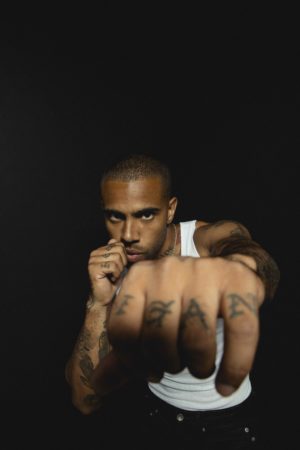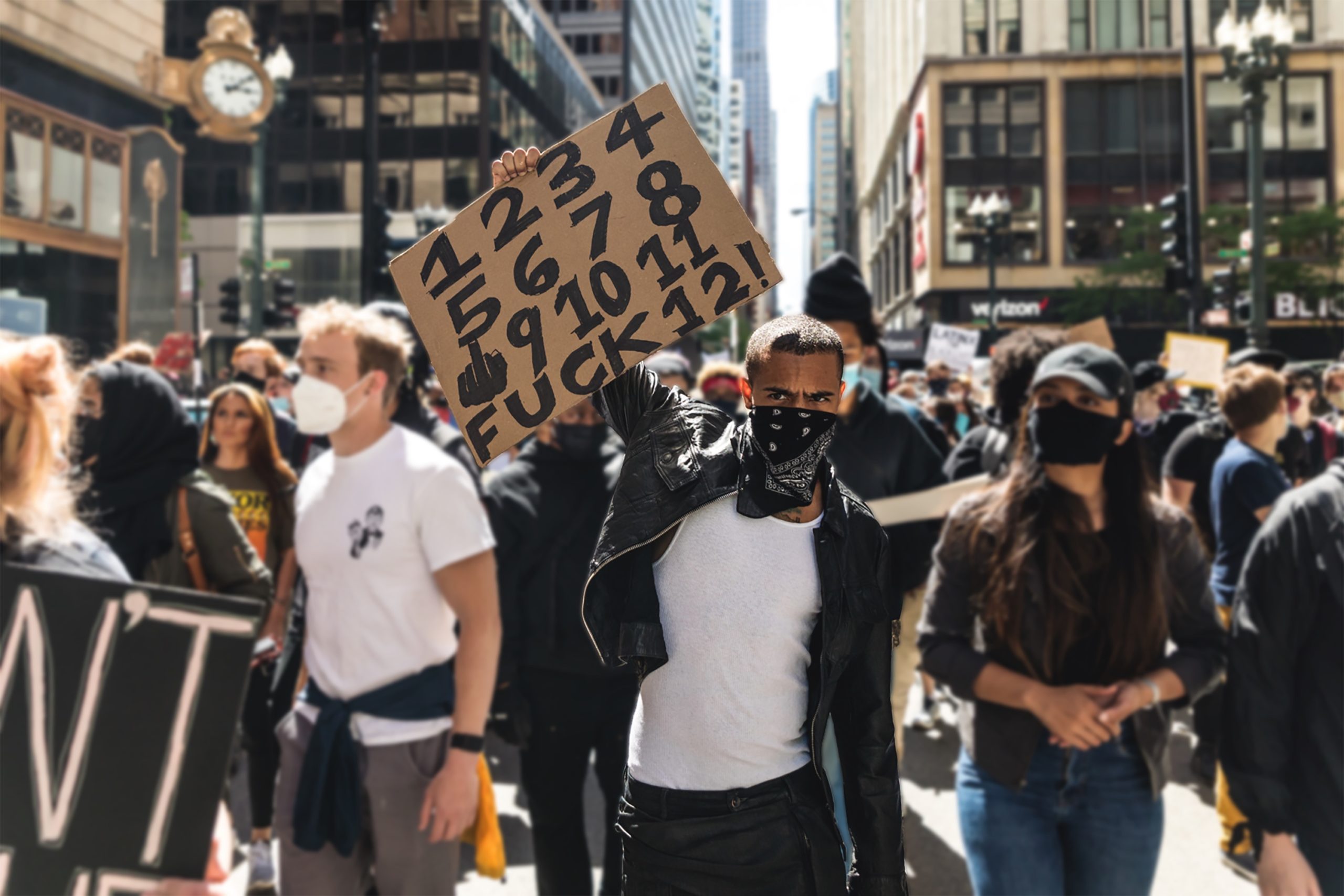This article appears in FLOOD 11: The Action Issue. You can purchase the magazine here. All proceeds benefit NIVA (National Independent Venue Alliance) and their efforts to save independent venues across the United States. #SaveOurStages
A city’s soul is expressed through its politics, and Chicago’s is full of paradoxes. Nothing is as simple as it seems; nothing is only one thing. It’s a city that reveres Abraham Lincoln as a secular saint and plasters his face on everything from diners to dumpsters, but has resisted racial integration as steadfastly and successfully as any Southern metropolis. It’s a place that celebrates its crucial role in the labor movement, but also reveres the police force that was founded to brutally suppress it. It’s a place where the line between activist and criminal is often blurred far past the point of recognition, at all levels of power, from South Side corners to City Hall.
Vic Mensa was born in the midst of the city’s contradictions in the neighborhood of Hyde Park, five blocks from the Obamas in one direction, five blocks from the projects in the other. He grew up in a stable two-parent middle class home, the son of a free-spirited white hippie and a Ghanian academic, watching crack dealers at work outside his front window. “It was blatantly obvious to me that these two different Americas existed,” he told me the first time we met, over coffee at a New York City luxury hotel, just before the pandemic. “I lived in one, but I was a neighbor to another.” Trying to make sense out of the surreal inequality around him provided the friction that first gave him his creative spark.

Every rapper that comes out of Chicago—from Common to Chief Keef—embodies the city’s contradictions. The “conscious rap” that helped put Chicago hip-hop on the map in the ’90s by tapping into the city’s history of socially aware soul music and radical Black political thought was bankrolled by local street gangs (which themselves were, in many cases, originally founded as community activist groups). The drill revolution that popped off early last decade was scorned by critics as the chillingly sociopathic antithesis of conscious rap, but the teens who created it grew up in community programs started by the Panthers, and have in many cases gone on to found their own community programs to honor that legacy.
Even for a Chicago rapper, Mensa is particularly full of conflicting ideas, and he loves exploding dualities more than any other Chi-Town rapper since Kanye West, one of his early mentors. He’s an unabashedly political artist with a catalogue full of crossover-friendly pop-rap singles celebrating late-capitalist consumption-as-hedonism, dripping with shout-outs to luxury cars and designer clothes. He’s an idealist with a nihilistic streak, who flip-flops between inspirational lyrics and paeans to “27 club” rock stars who died tragically young. He takes conspicuous pleasure in upending expectations from all sides, whether it’s shouting out crime lords in “conscious” songs or tweaking orthodox rap fans by starting a punk band (or provoking as wide an audience as possible by doing glam drag in a sequined body-hugging Confederate battle flag dress for one of their videos).
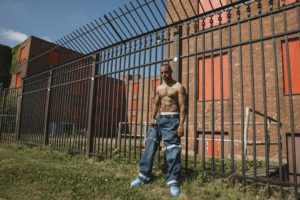
Of course, provocation and paradox make for great entertainment. They’re why we love rock stars like Iggy Pop and Kurt Cobain that Mensa not-so-subtly strives to emulate. He’s one of the most technically gifted rappers on his level, and he’s got the one-step-ahead instincts a young Jay-Z (who signed him to Roc Nation backstage at a Chicago concert shortly after a guest spot on Kanye’s “Wolves” shot him into the public consciousness), so when he takes risks—which is pretty much every time he puts something out into the world—there’s a good chance they’ll land.
His new V TAPE EP is just such a risky proposition—seven songs that abandon most of the platinum pop approach that Mensa’s refined over the decade or so he’s been recording in favor of the kind of hard-hitting hip-hop that hasn’t been in fashion since rappers discovered AutoTune. It’s a rap record in the mold of classic Nas, heavy on lyricism and sparing with hooks, blending stark confession, raw grievance, and street-level political analysis into a turbulent emotional cocktail, all delivered over beats layered in caked-on grime and flecked with bits of vintage chipmunk soul. Mensa raps like someone with his back up against the wall, lashing out at those who’ve wronged him, self-lacerating over the hurt he’s caused others, and delivering indictments of the system backed up by a substantial reading list and lived experience.
“It was blatantly obvious to me that these two different Americas existed. I lived in one, but I was a neighbor to another.”
It’s his most overtly political record yet, but also his most emotionally vulnerable. On “2HONEST” when he recounts finding a childhood notebook at his parents’ house where at age five he’d written, “I hate myself, I wanna die,” he’s close to tears. It might be a tough sell at a time when superstar rappers tend to treat the idea of fussing over lyrics with contempt, except that even when Mensa’s not aiming for pop playlists his music’s still hard to shake, even once the earbuds are out.
The whole project came together after COVID and quarantine, which brought Mensa back to Chicago from LA and inspired a return to his musical square one. Being locked down suited him. “Honestly, man, it’s been great for me, creatively,” he says over the phone in August, a few days after V TAPE dropped. “It’s just forced me to slow down and face myself and commit to myself. It gave me some space to sit back down with the pen and really focus on my lyrics and be rapping as much every day as I was doing when I was, like, sixteen in my mom’s basement and that was all I wanted to do.”
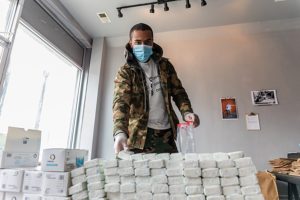
One of V TAPE’s recurring themes is the deceptively blurry line between what we think of as “good” and “bad” people, and how pointless it is to try and fit people in one category or the other. Mensa’s his own prime example. He presents himself less as a hero than as a collection of warring impulses and deep flaws—too reckless with himself and others, too easily distracted by the seductions of stardom and the street—still trying as hard as they can to do what they think is right. But he also talks a lot about Chicago street culture, which absorbed a lot of revolutionary thought when the city was a Black Panther stronghold, and where the same people enacting violent crime within a community can be the same ones protecting it from the threat of violence from outside.
“In Chicago we’re part of a legacy of organizing and organized crime,” Mensa explains. “Organizing for social causes, and for the protection and empowerment of the people, and also organizing for things that have been destructive to the people. And in my life, these worlds constantly cross paths. I go to Chairman Fred Hampton’s house, where he was assassinated, every December with Chairman Fred Jr. I also go to Moe Town [a rough neighborhood on the city’s West Side] with real live killers, and it’s just kinda my experience.”
“What we have is a toxic environment that’s a product of sustained systemic racism and inequity, and this toxic environment produces toxic actions. It also produces activists. And sometimes the lines get crossed. The shooter and the victim are one and the same.”
Mensa’s willingness to consider all sides of an equation extends even to the young men responsible for Chicago’s gun violence epidemic, who he refuses to demonize the way both the right and the left have. “It’s not black and white like people think it is,” he says. “What we have is a toxic environment that’s a product of sustained systemic racism and inequity, and this toxic environment produces toxic actions. It also produces activists. And sometimes the lines get crossed. The shooter and the victim are one and the same.”
Mensa absorbed a lot of radical thought growing up. “My parents were very political,” he says. “They kinda always gave me some more insight into history and society than I might get just being miseducated in school.” He also traced back the lyrical references he found in records by Common, Mos Def, and A Tribe Called Quest to sources like Malcolm X, Assata Shakur, and Huey P. Newton. (He has an old-time lefty’s habit of peppering conversation with well-worn quotes, like Martin Luther King Jr.’s, “Rioting is the language of the unheard,” as verbal shorthand.) But it wasn’t until the 2014 murder of 17-year-old Laquan McDonald by Chicago police officer Jason Van Dyke, and the City’s attempt to cover up video evidence of the shooting, that he felt inspired to address politics in his music directly.
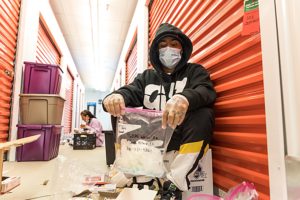
“At that point in time I really started to think about solidarity and think about making impact past just my words,” he says. “At first I was just jumping on planes and in cars and on busses and just going. Pulling up to be in Flint, Michigan, to be in Baton Rouge when Alton Sterling was killed, to be out there in the West Bank and Palestine.” He brought a busload of Chicago artists, poets, and activists to Standing Rock, along with a load of warming supplies and Reebok gear donated by a close friend, Pyer Moss designer Kirby Jean-Raymond. He started talking to victims of gun violence and people locked up on marijuana charges.
“As an artist, as a musician, I feel like I traverse in the currency of human experience, human emotion,” he says. “What better way to accrue that than to look somebody in the eyes and talk to them about what’s going on?”
In 2018 Mensa launched SaveMoneySaveLife, a philanthropic foundation that puts his words into direct action. It serves as an umbrella organization spanning a range of programs and initiatives covering everything from STEAM education for BIPOC youth, to cannabis justice, to training civilian first responders on the South Side, to helping compensate for the lack of official emergency services in an area plagued by gun violence.
“As an artist, as a musician, I feel like I traverse in the currency of human experience, human emotion. What better way to accrue that than to look somebody in the eyes and talk to them about what’s going on?”
SaveMoneySaveLife’s work is suffused with Mensa’s talents for provocation and spectacle. When Chicago cops were caught in a scheme to entrap residents of the impoverished Englewood neighborhood by leaving a “bait truck” full of sneakers unlocked and unattended (but under surveillance), Mensa and SMSL responded with an Anti-Bait Truck that distributed 15,000 pairs of donated sneakers to Englewood residents. Their efforts tend to be bluntly pragmatic, but also effective agitprop that highlights, by way of contrast, the neglect and abuse the city heaps on its Black neighborhoods. The generosity of the Anti-Bait Truck spotlights the cruelty of dangling free sneakers in front of people who can’t afford them. SMSL’s Street Medix program wouldn’t have to exist if the city cared enough about its Black residents to provide them with basic lifesaving medical care.
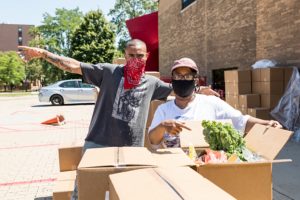
Like Mensa, the foundation is also flexible and quick to adapt. “When COVID kicked off, we largely pushed our focus to food and protective equipment,” he says. They got a local distillery to make hand sanitizer that they distributed throughout the city, along with masks, gloves, and a hundred thousand pounds of groceries. “And when everything kicked off in the streets, we picked back up with Street Medix and added a layer of attention to state violence, focusing on what to do in the event that someone is tear gassed, or how to recognize the sound cannons that they’re using.” It’s hard to imagine a more powerful indictment of the way the city of Chicago treats Black people than the fact that the same citizens who felt compelled to train as vigilante medics in order to combat gang violence have also felt compelled to train against violence from the people who are supposed to be protecting them.
Mensa’s consistently been out in the streets during the BLM uprisings, even when things have been popping off. At one protest recently, when street actions in Chicago were surging, police had cornered a group of protesters in his neighborhood. “The crowd was small,” he says, “so the police were being extremely brutal. Hitting all of us with batons and pepper spraying.”
He heard that a bigger group of “happy-go-lucky college students” was occupying Lake Shore Drive nearby. Mensa skated over to ask for help. “I got up there and I was like, ‘Yo, y’all need to be over on 53rd and Lake Park. That’s where it’s going down.’” Soon he was leading a march back over to Hyde Park with an army motivated by the situation at hand. The influx of bodies was a demonstration of the power of numbers, and the capacity for one charismatic voice to turn the tide.
“They stood the fuck down,” he says with pride. “Because now we were 400 deep.” FL
